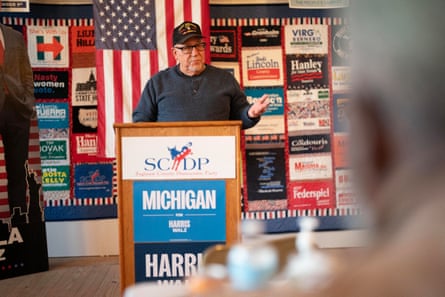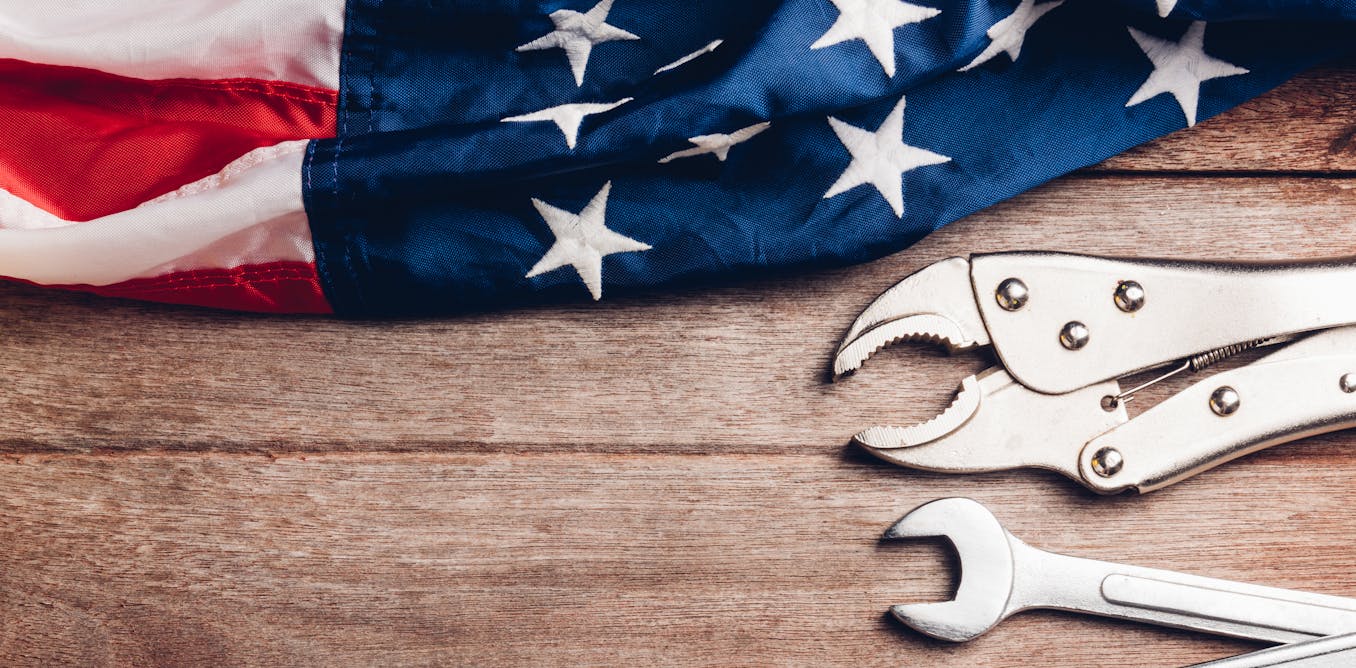Like so many military veterans, the ageing group of men and women adorned with badges of fighting forces and theaters of war hesitated to talk about their past lives. But after one finally spoke up to denounce the man they called “the devil”, the floodgates opened to an anger and alarm that went far beyond normal political discourse.
The veterans turned out on a warm evening to phone-bank for Kamala Harris in Saginaw, Michigan - a swing county in a key battleground state. But first they got to tell each other about where they served and the ways in which that shapes how they see next week’s presidential election.
Most enlisted decades ago, some for only a few years. But that was long enough when fighting in Korea or Vietnam to have marked out the course of their lives and shaped their views of the world. From that vantage point, the veterans look upon Donald Trump with undisguised disgust.
Some refused to even speak his name, including former air force electrician Josie Couch.
“This man here, that Kamala is running against, he’s like the devil and, you know, he ain’t even trying to hide it,” she told her fellow veterans.
Why Saginaw, Michigan?
ShowIn what is expected to be a knife-edge US election decided by a few voters in a handful of key battleground states, the Guardian is exploring Saginaw, Michigan. It is a swing area in a swing state whose voters will bear an outsize influence on the outcome of the fight between Kamala Harris and Donald Trump. Chris McGreal is on the ground in Saginaw in the run up to November's election examining the issues that voters of all political backgrounds care about.
Saginaw voters: tell us which issues will decide the US election
A younger generation of Americans is fearful that another Trump presidency will further erode the rights they thought were set in stone, particularly in the wake of the supreme court striking down the constitutional right to abortion.
The veterans bring a longer view shaped by early lives without many of the rights now under threat, not least greater racial and gender equality, and after having to fight for them in the first place. Couch, a Black woman, remembers her service and working life in the 1970s as a time of sexism, harassment and hostility that she and others struggled against.

Now, she said, Trump wants “to take away everything that we done work hard for, our parents worked hard for”.
“We all didn’t have a great service life because the men, they didn’t really want us to be there. I was called everything but Josie. I kind of forgot what my name was,” she said.
“It’s going to be terrible if we take steps back because we don’t know how to go back.”
Others in the hall shouted out: “We’re not going back.”
Couch continued.
“For them to take away women’s rights, come on now. How did we get here? If we didn’t stand up for our rights, we wouldn’t be here today,” she said.
“Men can’t tell you what to do with your body. I haven’t heard yet what they’re gonna do with the men’s bodies, so why do they want to keep pushing us down?”
Trump divides veterans in the same way he polarises other Americans. Some who served in the most senior positions in the military are now denouncing him openly.
Trump’s ex-chief of staff, retired marine corps general John Kelly, has warned that his former boss meets the definition of a fascist and would rule like a dictator if he were to return to the White House.
Other former generals and intelligence officials have joined in denouncing Trump, including the ex chair of the joint chiefs of staff Mark Milley, former CIA director John Brennan and Trump’s defence secretary Mark Esper.
But for the veterans in Saginaw, their anger is more visceral. They speak with unusual passion as their contempt for Trump spills out about the former president’s repeated disparaging of those who have served in the military and his targeting of some of the most vulnerable in society.
Dave Salogar stepped up to speak wearing a cap marking him as a veteran of the 101st Airborne in Vietnam. He began by telling the story of his grandparents, who fled the collapsing Austro-Hungarian empire in 1918 for Canada and then crossed the border illegally into the US.
Salogar’s grandfather was killed in a mining accident in Michigan in 1924 and his grandmother raised her children as a single mother while working in a cannery.
“So technically I’m the grandchild of illegal immigrants, and I hear the way immigrants are being beat up for all the ills when they’re the people that make America great. My grandmother, the illegal immigrant, eventually became a citizen at the age of 80. She sent two of her sons to fight in world war two. She sent a third son to Korea to fight and he was wounded,” said Salogar.

“Myself and two of my cousins, this illegal immigrant’s grandchildren, went off to Vietnam.”
Salogar joined a combat unit in 1968 at the age of 19 and served for nearly two years. He told the Guardian that the trauma of that war defined his life and cost him a series of jobs in the transportation industry after he sought refuge in alcohol for a decade. It’s one of the reasons he’s so contemptuous of Trump’s claim to have been unfit for military duty because of bone spurs.
But Salogar reserves his real ire for how the former president talks about other veterans. Several of those in the room expressed disgust at Trump’s 2015 attack on Senator John McCain, who was a prisoner of war in North Vietnam.
“He’s not a war hero. He was a war hero because he was captured? I like people who weren’t captured,” Trump said.
As president, Trump also derided American war dead as “suckers” and “losers” after refusing to visit a second world war US military cemetery in Normandy in 2020. In August, the US army publicly rebuked Trump campaign officials for turning a ceremony at Arlington national cemetery to mark the deaths of American soldiers in Afghanistan into a photo opportunity for the Republican presidential candidate.
Salogar does not hide his contempt.
“He said we’re suckers and losers. The man could not go to Normandy on June 6 to go to the cemetery because it was raining and he was going to mess his hair. What kind of man is that?” he said.
“I wasn’t old enough to vote when I was in Vietnam. Now I’m 76. This will probably be the last election I vote in, but it is the most important one.”
Jerry and Dale Blunk met and married while serving on a now-defunct US military base in Iceland. He was in the navy for nearly 24 years and she was in the air force.
Speaking to the Guardian, Jerry Blunk said he was supporting Harris because “it’s about time a woman became president of the United States”. Dale interrupted him.

“Well, that’s not the only reason because both of us agree that Trump can’t be allowed into office again. He has no respect for anyone except himself. He has no respect for the constitution. He has no respect for veterans. He doesn’t have any respect for anyone. So he can’t go back to the White House,” she said.
They, too, were infuriated by Trump’s disparaging of other veterans.
“The minute he said McCain wasn’t a warrior, it was an insult to everyone who fought and died,” said Dale.
But she is concerned about more than insults. Like others in the room, she questioned whether US democracy could survive another bout of Trump in the White House.
“I don’t think the rule of law will prevail. The supreme court has already given him unlimited power. You give that to an egotist and a fascist, then we’ve lost our country. Literally, we’ll lose our country,” she said.
Still, for all his anger at the former president’s failure to serve while disparaging those who did, Salogar pauses and reflects that Trump would have been a liability as a soldier.
“When I was 19, I learned you’re white, Black, brown, you all bleed red,” he said.
“I’m glad he wasn’t beside me, because I’ve witnessed unbelievable acts of courage, unbelievable acts of compassion and unbelievable acts of sacrifice by other 19- or 20-year-olds like myself.”

 German (DE)
German (DE)  English (US)
English (US)  Spanish (ES)
Spanish (ES)  French (FR)
French (FR)  Hindi (IN)
Hindi (IN)  Italian (IT)
Italian (IT)  Russian (RU)
Russian (RU)  3 weeks ago
3 weeks ago
























Comments